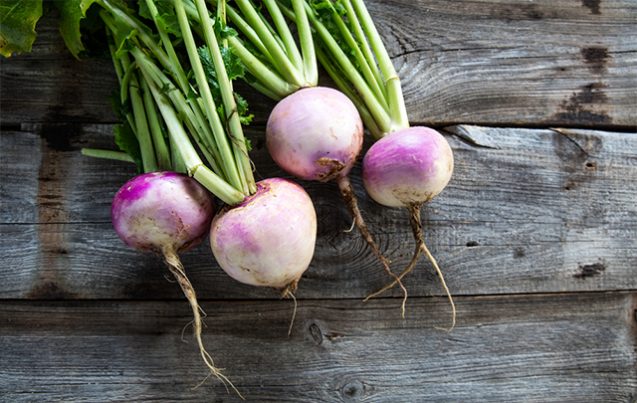
Turnips – sources, health benefits, nutrients, uses and constituents at NaturalPedia.com
Wednesday, June 21, 2017 by Frances Bloomfield
http://www.naturalpedia.com/turnips-sources-health-benefits-nutrients-uses-and-constituents-at-naturalpedia-com.html

Turnips (Brassica rapa) are cool-season root vegetables that belong to the Brassicaceae family, along with cabbages and Brussels sprouts. Cultivated for both human consumption and livestock feed, turnips are prized for the strong flavors of their roots and for their nutritional value. Turnips were staple foods during the ancient Greek and Roman periods, and are extensively used in the cuisines of Japan, Brazil, England, and Iran.

List of known nutrients
Fresh turnip roots are rich in vitamin C: A 100 g serving can provide 21 mg or 35 percent of the recommended daily allowance of this important mineral. From scavenging free radicals to boosting collagen synthesis to strengthening the immune system, vitamin C does a lot for the body.
Turnips are low in calories yet they pack other nutrients aside from vitamin C, particularly:
- Antioxidants, including ferulic acid
- Caffeic acid
- Calcium
- Carotenes, including Beta-Carotene
- Chlorophyll
- Copper
- Fiber
- Iron
- Lutein
- Magnesium
- Manganese
- Phosphorus
- Potassium
- Sulfur
- Vitamin A
- Vitamin B1 (Thiamine)
- Vitamin B2 (Riboflavin)
- Vitamin B3 (Niacin)
- Vitamin B5 (Pantothenic acid)
- Vitamin B6 (Pyridoxine)
- Vitamin B9 (Folic acid)
- Vitamin E
- Vitamin K
- Xanthin
Medicinal uses for turnips
Though a healthy vegetable overall, the turnip greens are the part that house the majority of antioxidants. The leafy greens offer vitamin A, vitamin C, xanthin, and lutein. These antioxidants work together with phytochemicals to combat disease-causing toxins in the body. Along with other nutrients, turnips are effective in preventing and decreasing the risks of:
- Anemia
- Atherosclerosis
- Cancer
- Catarrh
- Constipation
- Detoxification
- Diverticulosis
- Macular degeneration
- Mucous
- Osteoporosis
Turnips have two important nutrients for healthy hearts: fiber and potassium. While fiber removes excess cholesterol from the heart, potassium relaxes the blood vessels and arteries to lower blood pressure. Vitamin K has anti-inflammatory properties that extend to the heart.
Turnips are excellent foods for maintaining vision because of their vitamin C, vitamin A, and lutein content. Vitamin C and lutein protect the eyes from UV light damage, and vitamin A eliminates free radicals that could lead to macular degeneration and cataracts.
The turnip greens and roots contain tiny amounts of oxalic acid, which may crystallize into oxalate stones in the urinary tract and kidneys. People with a history of oxalate urinary tract stones should avoid turnips. Those with thyroid disorders should refrain from consuming turnips as well as certain compounds in turnips can affect the thyroid gland.
Body systems supported by turnips
The fiber in turnips is conducive to a healthy digestive system. By bulking up stool and facilitating better nutrition uptake from food, turnips can promote digestive efficiency. Another benefit from turnips is they decrease the chances of developing diverticulosis, or the presence of sacs along the wall of the gastrointestinal tract.
Turnips are equally adept at supporting other organs and body systems:
- Bones
- Eyes
- Heart
- Immune System
- Lungs
- Skin
Ways to use turnips
Both the roots and greens have culinary uses.
Baby turnips have a sweet taste that makes them a good complement for raw salads made of cabbage and parsnips. Raw baby turnips, on the other hand, go well with olives and cherry tomatoes as appetizers. Similar to radishes and carrots, both mature and baby turnips can be pickled.
Turnip greens are usually added to soups, curries, and stews. Though they’re usually cooked, turnip greens can do well in salads.
Where to learn more
- 10 Tips: Boost Serotonin Levels Naturally & Feel Happier
- How to Stop Bleeding – Top 10 Simple Effective Tips
- Liver Friendly Recipes: 3 Drinks That Detox Liver And Flush Out Fat
- Top Six Vitamin K Rich Foods
- Top Health Benefits of Turnip Greens
Summary
Turnips promote a healthy heart.
Turnips help maintain healthy vision.
People with a history of oxalate urinary tract stones should avoid turnips.
Turnips are excellent foods for maintaining vision because of their vitamin C, vitamin A, and lutein content. Vitamin C and lutein protect the eyes from UV light damage, and vitamin A eliminates free radicals that could lead to macular degeneration and cataracts.
Sources include:
OrganicFacts.net
Nutrition-And-You.com
StyleCraze.com
MedicalNewsToday.com
BonAppetit.com
Tagged Under: Tags: Turnips





